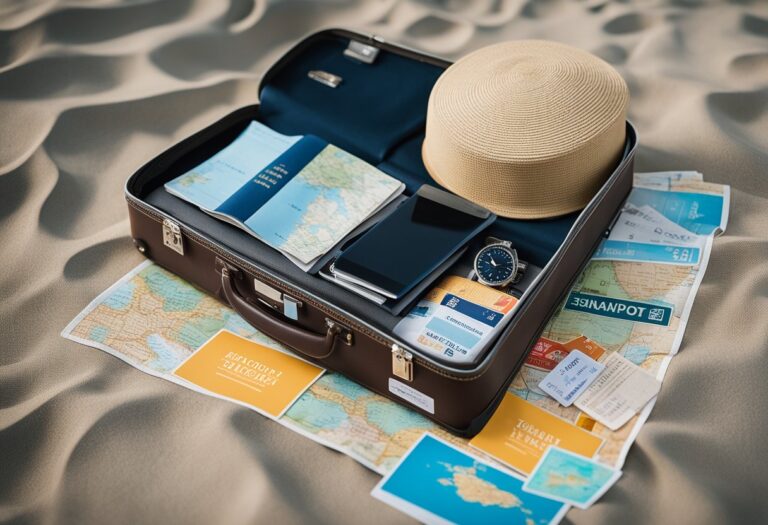10 Travel Insurance myths
Unveiling Travel Insurance Myths
The world of travel is filled with exciting adventures and unforgettable experiences. But let’s face it, unexpected events can disrupt even the most meticulously planned trips.
Here’s where travel insurance steps in, offering a safety net to protect your finances from unforeseen circumstances.
However, misconceptions and myths often cloud the understanding of travel insurance.
Todays feature aims to debunk some of the most common travel insurance myths, empowering you to make informed decisions and leverage this valuable travel companion.
Key Takeaways
- Travel insurance isn’t a one-size-fits-all solution, but a valuable tool that enhances your travel experience. Don’t be swayed by misconceptions!
- Remember, travel insurance policies are clear and customizable, not automatically included with bookings, and claim processes are designed to be efficient.
- While some adventure activities might require additional coverage, travel insurance is valuable for all ages and health conditions.
- By comparing quotes and understanding exclusions, you can find affordable coverage that protects your investment.

Common Travel Insurance Myths
Myth #1: Travel insurance is only necessary for expensive trips.
Busted! While expensive trips warrant higher coverage amounts, travel insurance is valuable for journeys of all budgets. Imagine this: you contract a sudden illness before a weekend getaway, forcing you to cancel. Non-refundable hotel bookings and flight tickets can leave a significant dent in your wallet. Travel insurance with trip cancellation coverage can reimburse these costs, minimizing the financial blow.
Myth #2: My health insurance covers everything that might happen during my trip.
Busted! There’s a crucial distinction between health insurance and travel insurance. While your regular health insurance might offer some coverage for medical emergencies at home, it might not extend fully to foreign countries. Travel insurance specifically addresses medical emergencies abroad, covering hospitalization costs, doctor visits, and even emergency medical evacuation.
Myth #3: Travel insurance is a waste of money. I’ll never need it.
Busted! Think of travel insurance as a safety net. You might not always need it, but it’s there to provide peace of mind and financial protection when the unexpected arises. A lost passport, trip delays, or damaged luggage can significantly disrupt your travel plans and incur unexpected costs. Travel insurance can reimburse these expenses, ensuring your trip isn’t financially derailed.
Myth #4: Travel insurance is complicated and difficult to understand.
Busted! Travel insurance policies are designed to be clear and straightforward. Most reputable insurance companies offer different coverage options, allowing you to tailor a plan that suits your specific needs and budget. Don’t hesitate to ask questions or seek clarification from insurance providers if anything seems unclear.
Myth #5: Travel insurance is automatically included with my travel booking.
Busted! In most cases, travel insurance is an optional add-on during the booking process. While some credit cards or travel memberships might offer basic travel insurance benefits, it’s crucial to review the details and coverage limits. It’s always advisable to compare different travel insurance options before purchasing to ensure you get the coverage you need.
Myth #6: Filing a travel insurance claim is a lengthy and difficult process.
Busted! Reputable travel insurance companies strive to make the claim process as smooth as possible. While the specifics might vary depending on the company and the situation, the general process involves contacting your insurer promptly after the covered event, gathering necessary documentation (receipts, medical reports), and cooperating with the claims adjuster.

Myth #7: Travel insurance doesn’t cover adventure activities.
Busted! Many travel insurance plans offer coverage for adventure activities, but with some caveats. It’s crucial to check the policy details and exclusions. Some plans might require you to purchase additional coverage for specific high-risk activities like bungee jumping or skydiving.
Myth #8: I’m young and healthy, so I don’t need travel insurance.
Busted! Accidents or illnesses can strike anyone, regardless of age or health. Travel insurance ensures you’re financially protected even in unforeseen circumstances. Additionally, some travel insurance plans offer benefits beyond medical emergencies, such as trip cancellation due to a family member’s illness or trip interruption due to natural disasters.
Myth #9: Travel insurance is expensive and not worth the cost.
Busted! Travel insurance costs vary depending on your trip details, coverage options, and deductible chosen. By comparing quotes and selecting a plan that aligns with your needs, you can find affordable travel insurance that provides valuable protection without breaking the bank.
Myth #10: Travel insurance covers everything that might go wrong on my trip.
Busted! Travel insurance policies have exclusions. It’s essential to carefully review the policy wording to understand what’s covered and what’s not. Common exclusions might include pre-existing medical conditions, cancellation due to change of mind, or engaging in activities explicitly excluded by the policy.
Travel Insurance for travelers
Travel insurance is a financial safety net designed to protect travelers from unexpected disruptions such as trip cancellations, medical emergencies abroad, or lost luggage.
It provides peace of mind by covering unforeseen expenses that could otherwise turn a dream vacation into a nightmare.
Types of Travel Insurance Policies
Trip Cancellation Insurance: Reimburses non-refundable trip expenses if you have to cancel or cut short your trip due to unforeseen circumstances.
Travel Medical Insurance: Covers medical expenses, evacuation, and repatriation in case of illness or injury while traveling.
Baggage and Personal Belongings Insurance: Provides coverage for lost, stolen, or damaged luggage and personal items.
Emergency Evacuation Insurance: Covers the cost of emergency transportation to the nearest adequate medical facility.
Benefits of Travel Insurance
Travel insurance not only safeguards your finances but also offers peace of mind
- Protects your investment in travel expenses
- Provides medical coverage abroad
- Offers assistance in emergencies 24/7
- Ensures reimbursement for lost or stolen belongings
Factors Influencing Travel Insurance Costs
Several factors affect the cost of travel insurance:
Destination and trip duration
Age and health of travelers
Level of coverage and deductible chosen
Type of activities planned (e.g., adventure sports)

Choosing the Right Travel Insurance Policy Tailor your policy to your specific travel needs:
- Assess the level of coverage required
- Compare quotes from different insurers
- Review policy exclusions and limitations
- Consider additional coverage options like rental car insurance or adventure sports coverage
Understanding the Claims Process Navigating the claims process smoothly is essential;
Contact your insurer immediately in case of an emergency
Keep all documentation and receipts
Follow the insurer’s instructions for filing a claim promptly
Travel Insurance FAQs
What is travel insurance? Travel insurance is a type of financial protection that helps cover unexpected expenses related to traveling, such as trip cancellations, medical emergencies abroad, lost luggage, and more.
2. Why do I need travel insurance? Travel insurance provides peace of mind by offering financial protection against unforeseen events that could disrupt or cancel your trip, ensuring you don’t lose money on non-refundable bookings.
3. What does travel insurance typically cover? Travel insurance commonly covers:
- Trip cancellation or interruption
- Emergency medical expenses
- Evacuation and repatriation
- Lost, stolen, or delayed baggage
4. When should I buy travel insurance? It’s advisable to buy travel insurance as soon as you book your trip. This ensures you’re covered for any unexpected events that may arise before or during your journey.
5. How much does travel insurance cost? The cost of travel insurance depends on factors like your age, destination, trip duration, and the level of coverage you choose. It typically ranges from a small percentage to a fraction of your total trip cost.
6. Does travel insurance cover COVID-19-related issues? Coverage for COVID-19-related issues varies by policy and insurer. Some policies may provide coverage for trip cancellations or medical expenses related to COVID-19, so it’s essential to check the terms and conditions.
7. Are there exclusions in travel insurance policies? Yes, travel insurance policies may have exclusions such as pre-existing medical conditions, adventurous activities like extreme sports, and certain high-risk destinations. It’s crucial to read the policy details carefully.
8. How do I file a claim with my travel insurance? To file a claim, you typically need to contact your insurance provider as soon as possible. You’ll need to provide documentation such as receipts, medical reports (if applicable), and proof of expenses incurred due to the covered event.
9. Can I cancel my travel insurance policy if my plans change? Yes, many travel insurance policies offer a free look period, usually within a specified timeframe after purchase, during which you can cancel the policy and receive a full refund of the premium paid.
10. Is travel insurance necessary for domestic trips? While travel insurance is more commonly associated with international travel, it can also be beneficial for domestic trips, providing coverage for trip cancellations, medical emergencies, and other unforeseen events.
11. What happens if I don’t buy travel insurance? If you don’t have travel insurance and an unforeseen event occurs, you may be responsible for covering expenses such as trip cancellations, medical emergencies, or lost belongings out of pocket.
12. Can I purchase travel insurance for a one-way trip? Yes, you can purchase travel insurance for both round-trip and one-way trips. It’s essential to select a policy that matches your specific travel plans and coverage needs.
13. How can I compare travel insurance policies? To compare travel insurance policies effectively, consider factors such as coverage limits, exclusions, deductibles, premium costs, customer reviews, and the insurer’s reputation for claims handling.
14. Does travel insurance cover adventure activities like skiing or scuba diving? Some travel insurance policies offer coverage for adventurous activities, while others may require additional coverage options. Always check your policy to ensure your planned activities are covered.
15. What should I look for in a good travel insurance policy? Look for a travel insurance policy that provides adequate coverage for your trip’s cost, offers comprehensive medical coverage, includes coverage for trip cancellations and interruptions, and has favorable terms for filing claims.
16. How does travel insurance handle pre-existing medical conditions? Coverage for pre-existing medical conditions varies by policy. Some insurers offer coverage if certain conditions are met, such as purchasing the policy within a specified timeframe after booking your trip.
17. Can I get a refund for my travel insurance if I cancel my trip? Many travel insurance policies have a cancellation provision that allows you to receive a refund of the premium paid if you cancel your trip within a specified timeframe before departure.
18. Is travel insurance mandatory for international travel? Travel insurance is not mandatory for international travel in most cases, but it’s highly recommended to protect yourself against unexpected expenses and emergencies that may occur abroad.
19. What should I do if my travel insurance claim is denied? If your travel insurance claim is denied, review the reasons provided by the insurer. You may have the option to appeal the decision or seek assistance from consumer advocacy organizations or insurance regulators.
20. Can I extend my travel insurance coverage while traveling? Some travel insurance policies offer options to extend coverage while traveling, depending on the insurer and policy terms. Contact your insurance provider to inquire about extension options and requirements.
Conclusion
Imagine yourself basking on a pristine beach, worry-free and exhilarated.
Travel insurance empowers you to embrace unexpected situations with confidence.
With the right coverage in place, you can focus on creating lasting memories, savoring cultural experiences, and conquering new adventures.
Don’t let travel hiccups derail your dream vacation.
Equip yourself with the knowledge and protection of travel insurance, and embark on your next escapade with complete peace of mind.
After all, the world awaits explore it with the confidence that comes with being prepared!



